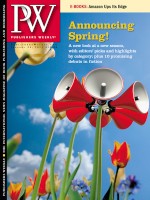According to Canada's first-ever National Book Count, 2.7 million books were purchased from stores and online retailers or borrowed from libraries from January 10 to 16. That's an encouraging number in a nation of about 35 million people, said Jamie Broadhurst, a spokesman for the National Reading Campaign, which organized the count. However, he added, there is a need to cultivate and support that love of reading, particularly among children.
The National Reading Campaign began in 2008 when a group of concerned librarians, parents, teachers, authors, booksellers, publishers, and corporate leaders came together with the goal of developing a national reading strategy for Canada. The group, including Rick Wilks, cofounder of Annick Press, and Patsy Aldana, publisher of Groundwood Books, were worried by cutbacks in public and school libraries, and some polls that indicated the number of children who said they read for pleasure was declining. There were "early warning signs that we have a nation of readers in Canada today, but there's no guarantee that we'll have a nation of readers in 10 years, so the time to act is now," said Broadhurst.
This year's book count was intended to provide a base figure to measure the success of the campaign in the future. In the week, 1,110,568 books were sold by retailers and online retailers, including Indigo Books & Music, Amazon.ca, and other national chains as well as more than 260 independent bookstores across the country. The retailers represent about 80% of the English-language book retail market and 40% of the French-language retail market across Canada. No individual consumer information was collected. The count also found that 1,604,378 books were borrowed from 22 participating public library systems, a figure that included digital downloads.
"This is just a snapshot of a typical week in Canada. There were no extraordinary releases or anything like that," said Broadhurst. "As an industry, we've never pulled together all the aggregation services," he added, such as Book Manager and BookNet. "When you put all those together... the number is quite stunning."
Broadhurst said that a comparison with the approximately two million viewers of the first game for Hockey Night in Canada on January 15 is useful. In light of the similar numbers, he said, "suddenly, reading no longer seems like an old-fashioned or elitist or declining activity. In fact, it is right at the heart of popular entertainment in Canada." The campaigners would like Canadians to identify reading as a part of their national identity in the same way they identify with hockey as the national pastime.
The National Reading Campaign hosted a summit in Montreal on January 20 and 21, discussing best practices for reading for groups such as aboriginal peoples, new immigrants to Canada, as well as new teaching techniques from countries such as China. A final summit will be held in Vancouver in two years. The aim is to recommend policies to government, but Broadhurst said organizers also believe there must be a more active role in building a passion for reading among individual citizens, including parents. "In every province and every city, budgets are under intense scrutiny. How do we make sure that books are part of the lives of every child in Canada?" he said.



 Volume 258
Issue 04
01/24/2011
Volume 258
Issue 04
01/24/2011





